Analyzing Deloitte's Social Innovation in India: A Reflective Report
VerifiedAdded on 2023/06/18
|15
|4431
|302
Report
AI Summary
This report reflects on Deloitte's social innovation initiative in India, focusing on leveraging growth opportunities and addressing competition through socially responsible strategies. The core of Deloitte's approach is a financial advice application in multiple Indian languages, aimed at enhancing financial literacy among marginalized communities. The report identifies key social barriers such as political instability, cultural diversity, and operational risks, alongside leadership challenges like balancing regional and strategic objectives, workforce diversity, and expatriate performance. It suggests strategies to overcome these challenges, including increased workforce involvement, community collaboration, and positive employer branding. The report emphasizes the importance of social innovation for Deloitte to gain a competitive edge, improve its brand image, and achieve sustainable growth in the Indian market, while also contributing to the economic development of the region by improving financial literacy and empowering individuals to make informed financial decisions. Desklib offers similar solved assignments for students.
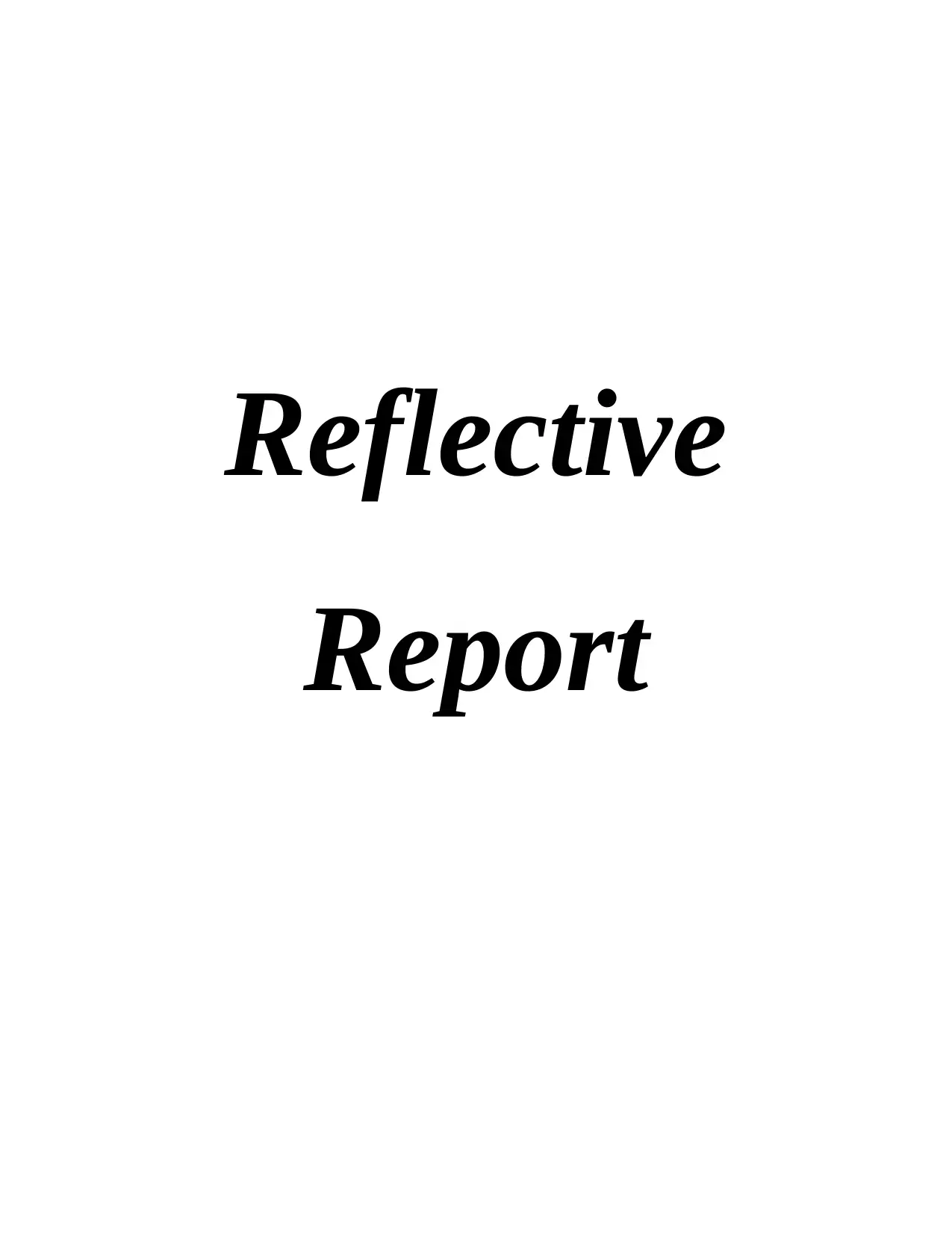
Reflective
Report
Report
Paraphrase This Document
Need a fresh take? Get an instant paraphrase of this document with our AI Paraphraser

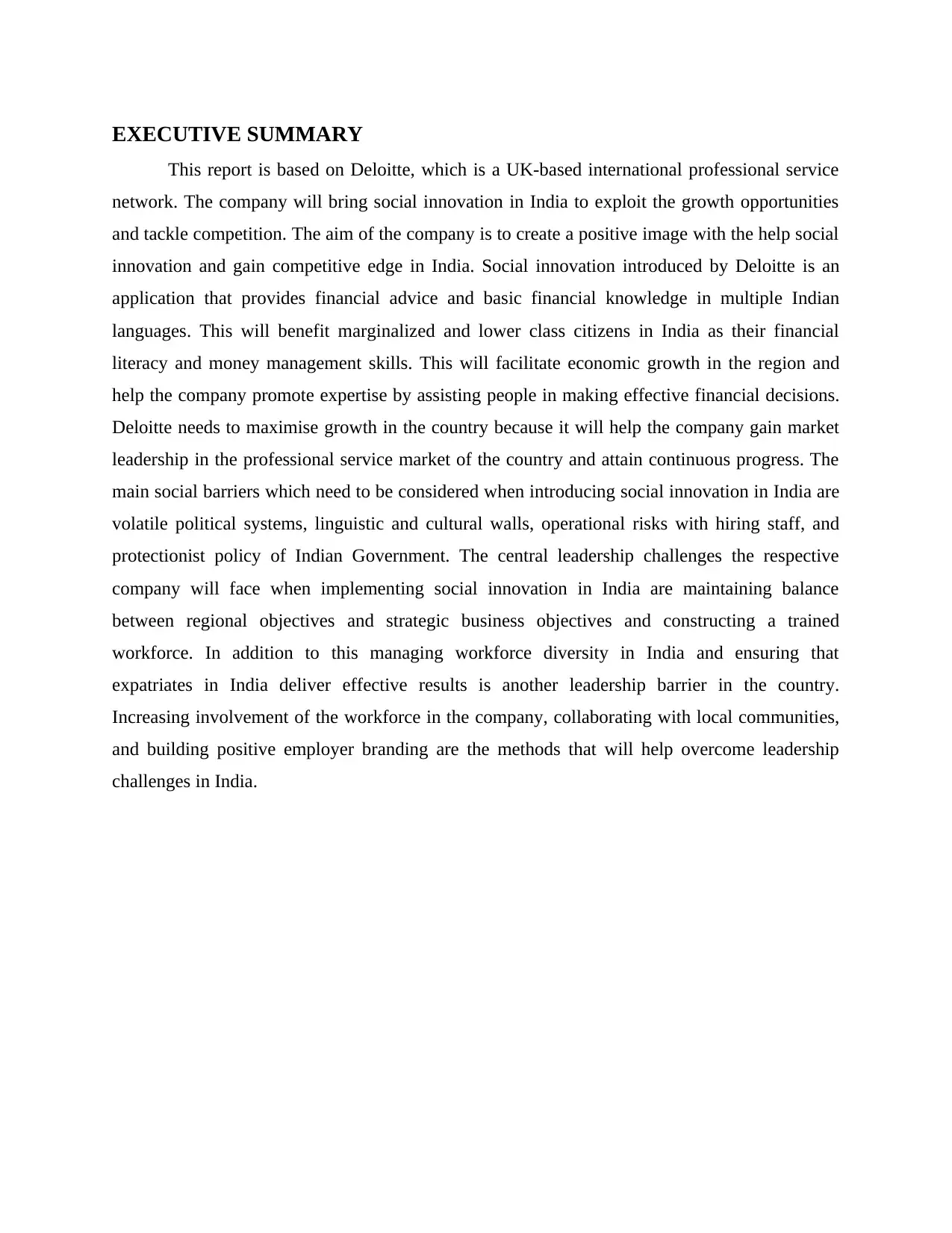
EXECUTIVE SUMMARY
This report is based on Deloitte, which is a UK-based international professional service
network. The company will bring social innovation in India to exploit the growth opportunities
and tackle competition. The aim of the company is to create a positive image with the help social
innovation and gain competitive edge in India. Social innovation introduced by Deloitte is an
application that provides financial advice and basic financial knowledge in multiple Indian
languages. This will benefit marginalized and lower class citizens in India as their financial
literacy and money management skills. This will facilitate economic growth in the region and
help the company promote expertise by assisting people in making effective financial decisions.
Deloitte needs to maximise growth in the country because it will help the company gain market
leadership in the professional service market of the country and attain continuous progress. The
main social barriers which need to be considered when introducing social innovation in India are
volatile political systems, linguistic and cultural walls, operational risks with hiring staff, and
protectionist policy of Indian Government. The central leadership challenges the respective
company will face when implementing social innovation in India are maintaining balance
between regional objectives and strategic business objectives and constructing a trained
workforce. In addition to this managing workforce diversity in India and ensuring that
expatriates in India deliver effective results is another leadership barrier in the country.
Increasing involvement of the workforce in the company, collaborating with local communities,
and building positive employer branding are the methods that will help overcome leadership
challenges in India.
This report is based on Deloitte, which is a UK-based international professional service
network. The company will bring social innovation in India to exploit the growth opportunities
and tackle competition. The aim of the company is to create a positive image with the help social
innovation and gain competitive edge in India. Social innovation introduced by Deloitte is an
application that provides financial advice and basic financial knowledge in multiple Indian
languages. This will benefit marginalized and lower class citizens in India as their financial
literacy and money management skills. This will facilitate economic growth in the region and
help the company promote expertise by assisting people in making effective financial decisions.
Deloitte needs to maximise growth in the country because it will help the company gain market
leadership in the professional service market of the country and attain continuous progress. The
main social barriers which need to be considered when introducing social innovation in India are
volatile political systems, linguistic and cultural walls, operational risks with hiring staff, and
protectionist policy of Indian Government. The central leadership challenges the respective
company will face when implementing social innovation in India are maintaining balance
between regional objectives and strategic business objectives and constructing a trained
workforce. In addition to this managing workforce diversity in India and ensuring that
expatriates in India deliver effective results is another leadership barrier in the country.
Increasing involvement of the workforce in the company, collaborating with local communities,
and building positive employer branding are the methods that will help overcome leadership
challenges in India.
⊘ This is a preview!⊘
Do you want full access?
Subscribe today to unlock all pages.

Trusted by 1+ million students worldwide
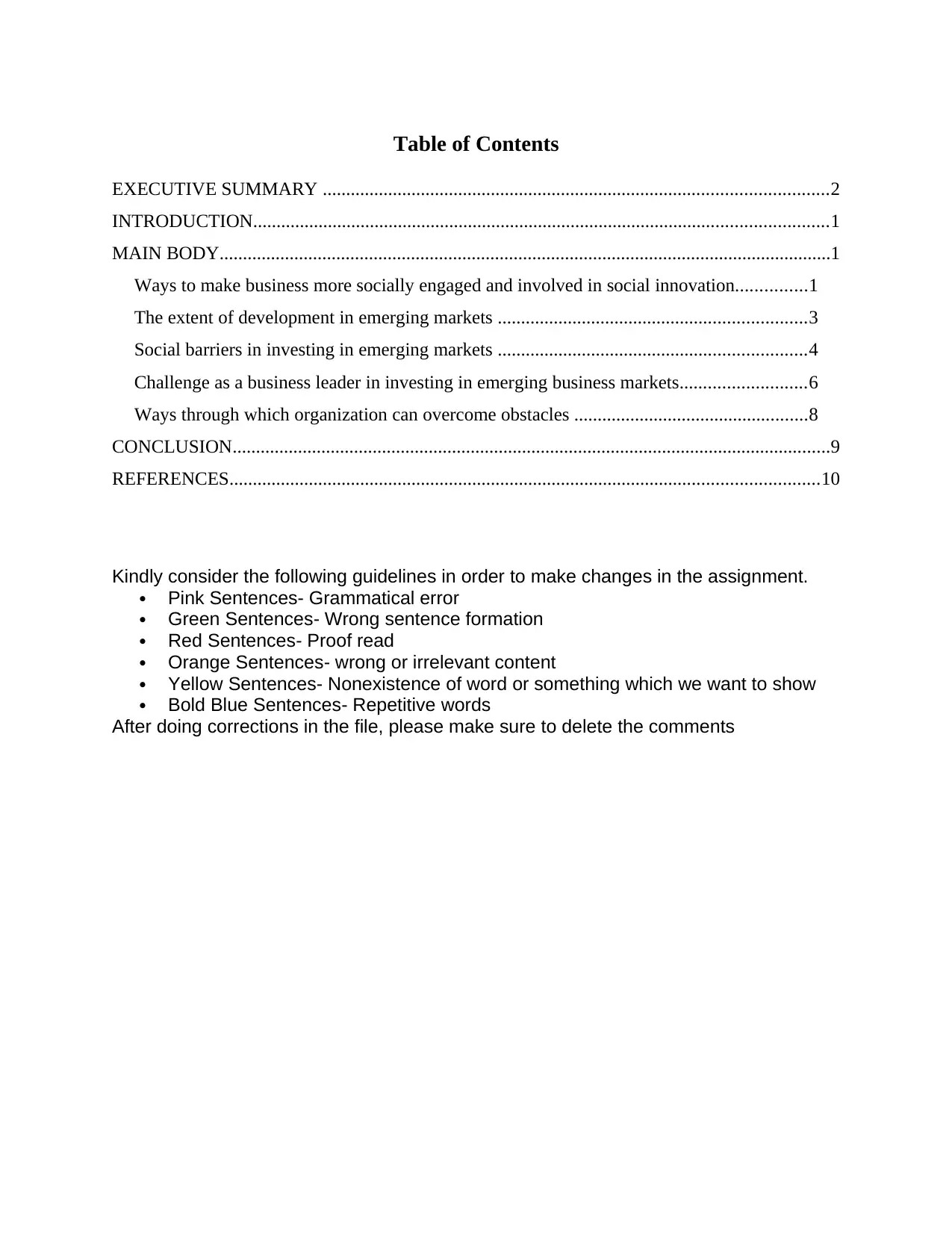
Table of Contents
EXECUTIVE SUMMARY ............................................................................................................2
INTRODUCTION...........................................................................................................................1
MAIN BODY...................................................................................................................................1
Ways to make business more socially engaged and involved in social innovation...............1
The extent of development in emerging markets ..................................................................3
Social barriers in investing in emerging markets ..................................................................4
Challenge as a business leader in investing in emerging business markets...........................6
Ways through which organization can overcome obstacles ..................................................8
CONCLUSION................................................................................................................................9
REFERENCES..............................................................................................................................10
Kindly consider the following guidelines in order to make changes in the assignment.
Pink Sentences- Grammatical error
Green Sentences- Wrong sentence formation
Red Sentences- Proof read
Orange Sentences- wrong or irrelevant content
Yellow Sentences- Nonexistence of word or something which we want to show
Bold Blue Sentences- Repetitive words
After doing corrections in the file, please make sure to delete the comments
EXECUTIVE SUMMARY ............................................................................................................2
INTRODUCTION...........................................................................................................................1
MAIN BODY...................................................................................................................................1
Ways to make business more socially engaged and involved in social innovation...............1
The extent of development in emerging markets ..................................................................3
Social barriers in investing in emerging markets ..................................................................4
Challenge as a business leader in investing in emerging business markets...........................6
Ways through which organization can overcome obstacles ..................................................8
CONCLUSION................................................................................................................................9
REFERENCES..............................................................................................................................10
Kindly consider the following guidelines in order to make changes in the assignment.
Pink Sentences- Grammatical error
Green Sentences- Wrong sentence formation
Red Sentences- Proof read
Orange Sentences- wrong or irrelevant content
Yellow Sentences- Nonexistence of word or something which we want to show
Bold Blue Sentences- Repetitive words
After doing corrections in the file, please make sure to delete the comments
Paraphrase This Document
Need a fresh take? Get an instant paraphrase of this document with our AI Paraphraser
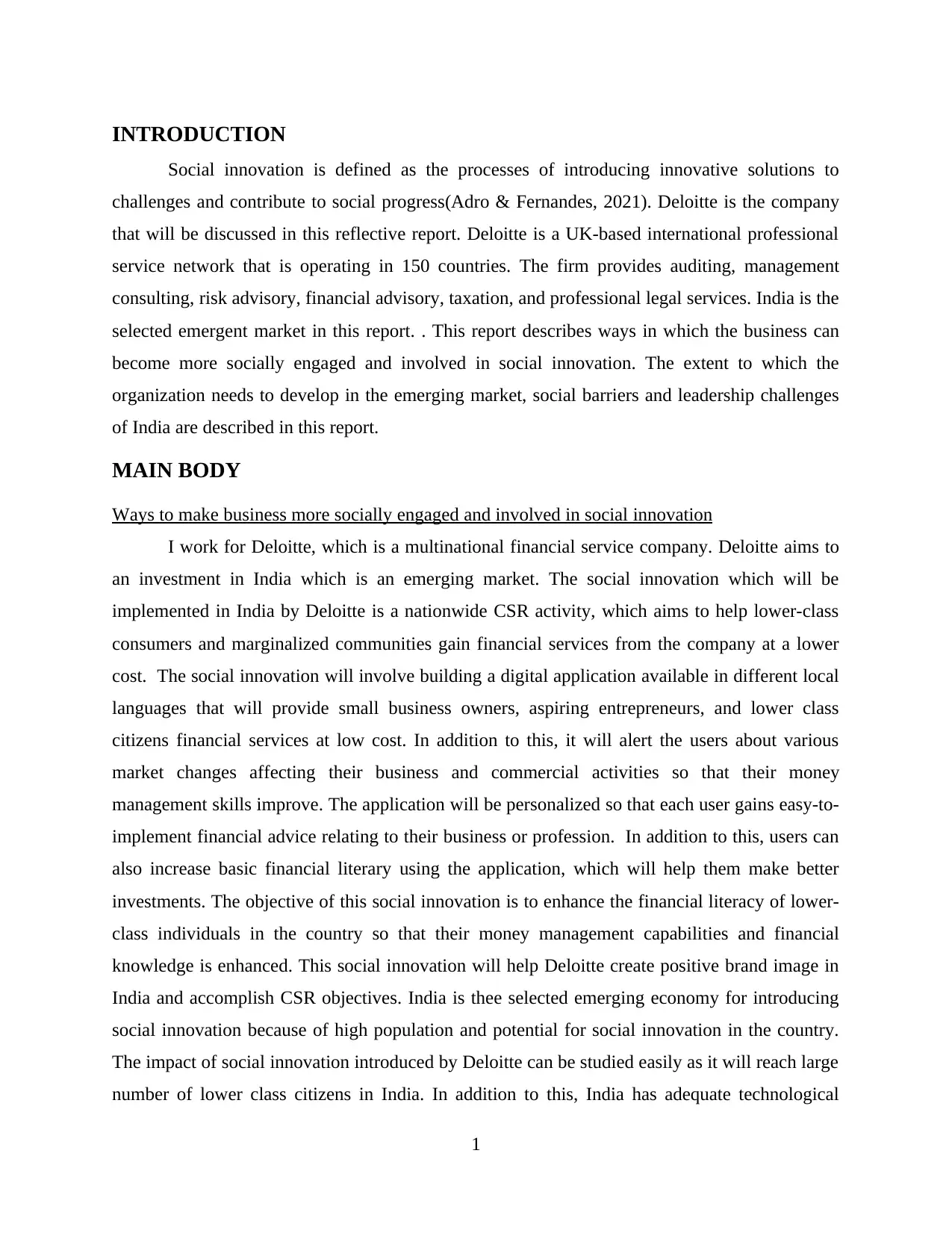
INTRODUCTION
Social innovation is defined as the processes of introducing innovative solutions to
challenges and contribute to social progress(Adro & Fernandes, 2021). Deloitte is the company
that will be discussed in this reflective report. Deloitte is a UK-based international professional
service network that is operating in 150 countries. The firm provides auditing, management
consulting, risk advisory, financial advisory, taxation, and professional legal services. India is the
selected emergent market in this report. . This report describes ways in which the business can
become more socially engaged and involved in social innovation. The extent to which the
organization needs to develop in the emerging market, social barriers and leadership challenges
of India are described in this report.
MAIN BODY
Ways to make business more socially engaged and involved in social innovation
I work for Deloitte, which is a multinational financial service company. Deloitte aims to
an investment in India which is an emerging market. The social innovation which will be
implemented in India by Deloitte is a nationwide CSR activity, which aims to help lower-class
consumers and marginalized communities gain financial services from the company at a lower
cost. The social innovation will involve building a digital application available in different local
languages that will provide small business owners, aspiring entrepreneurs, and lower class
citizens financial services at low cost. In addition to this, it will alert the users about various
market changes affecting their business and commercial activities so that their money
management skills improve. The application will be personalized so that each user gains easy-to-
implement financial advice relating to their business or profession. In addition to this, users can
also increase basic financial literary using the application, which will help them make better
investments. The objective of this social innovation is to enhance the financial literacy of lower-
class individuals in the country so that their money management capabilities and financial
knowledge is enhanced. This social innovation will help Deloitte create positive brand image in
India and accomplish CSR objectives. India is thee selected emerging economy for introducing
social innovation because of high population and potential for social innovation in the country.
The impact of social innovation introduced by Deloitte can be studied easily as it will reach large
number of lower class citizens in India. In addition to this, India has adequate technological
1
Social innovation is defined as the processes of introducing innovative solutions to
challenges and contribute to social progress(Adro & Fernandes, 2021). Deloitte is the company
that will be discussed in this reflective report. Deloitte is a UK-based international professional
service network that is operating in 150 countries. The firm provides auditing, management
consulting, risk advisory, financial advisory, taxation, and professional legal services. India is the
selected emergent market in this report. . This report describes ways in which the business can
become more socially engaged and involved in social innovation. The extent to which the
organization needs to develop in the emerging market, social barriers and leadership challenges
of India are described in this report.
MAIN BODY
Ways to make business more socially engaged and involved in social innovation
I work for Deloitte, which is a multinational financial service company. Deloitte aims to
an investment in India which is an emerging market. The social innovation which will be
implemented in India by Deloitte is a nationwide CSR activity, which aims to help lower-class
consumers and marginalized communities gain financial services from the company at a lower
cost. The social innovation will involve building a digital application available in different local
languages that will provide small business owners, aspiring entrepreneurs, and lower class
citizens financial services at low cost. In addition to this, it will alert the users about various
market changes affecting their business and commercial activities so that their money
management skills improve. The application will be personalized so that each user gains easy-to-
implement financial advice relating to their business or profession. In addition to this, users can
also increase basic financial literary using the application, which will help them make better
investments. The objective of this social innovation is to enhance the financial literacy of lower-
class individuals in the country so that their money management capabilities and financial
knowledge is enhanced. This social innovation will help Deloitte create positive brand image in
India and accomplish CSR objectives. India is thee selected emerging economy for introducing
social innovation because of high population and potential for social innovation in the country.
The impact of social innovation introduced by Deloitte can be studied easily as it will reach large
number of lower class citizens in India. In addition to this, India has adequate technological
1
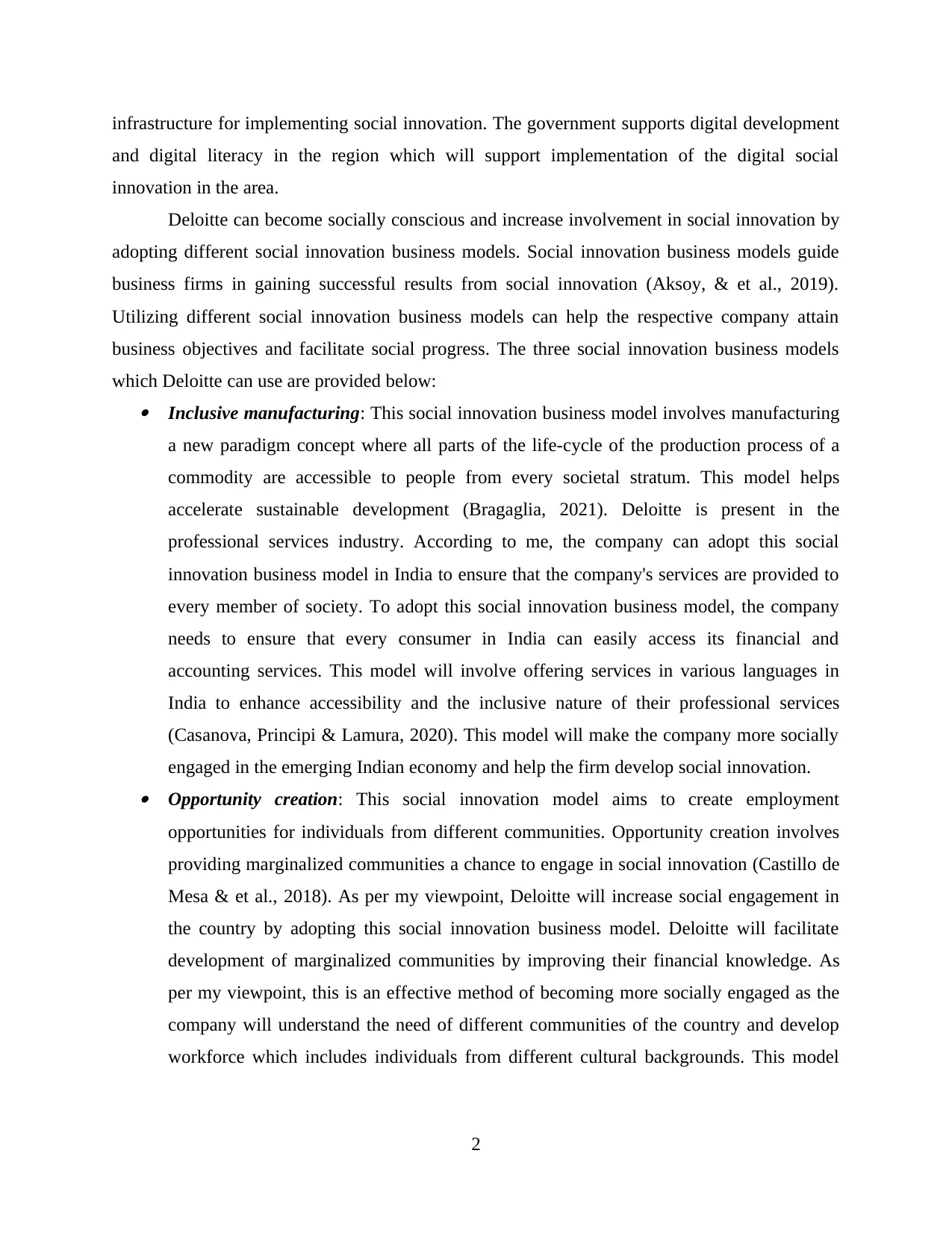
infrastructure for implementing social innovation. The government supports digital development
and digital literacy in the region which will support implementation of the digital social
innovation in the area.
Deloitte can become socially conscious and increase involvement in social innovation by
adopting different social innovation business models. Social innovation business models guide
business firms in gaining successful results from social innovation (Aksoy, & et al., 2019).
Utilizing different social innovation business models can help the respective company attain
business objectives and facilitate social progress. The three social innovation business models
which Deloitte can use are provided below: Inclusive manufacturing: This social innovation business model involves manufacturing
a new paradigm concept where all parts of the life-cycle of the production process of a
commodity are accessible to people from every societal stratum. This model helps
accelerate sustainable development (Bragaglia, 2021). Deloitte is present in the
professional services industry. According to me, the company can adopt this social
innovation business model in India to ensure that the company's services are provided to
every member of society. To adopt this social innovation business model, the company
needs to ensure that every consumer in India can easily access its financial and
accounting services. This model will involve offering services in various languages in
India to enhance accessibility and the inclusive nature of their professional services
(Casanova, Principi & Lamura, 2020). This model will make the company more socially
engaged in the emerging Indian economy and help the firm develop social innovation. Opportunity creation: This social innovation model aims to create employment
opportunities for individuals from different communities. Opportunity creation involves
providing marginalized communities a chance to engage in social innovation (Castillo de
Mesa & et al., 2018). As per my viewpoint, Deloitte will increase social engagement in
the country by adopting this social innovation business model. Deloitte will facilitate
development of marginalized communities by improving their financial knowledge. As
per my viewpoint, this is an effective method of becoming more socially engaged as the
company will understand the need of different communities of the country and develop
workforce which includes individuals from different cultural backgrounds. This model
2
and digital literacy in the region which will support implementation of the digital social
innovation in the area.
Deloitte can become socially conscious and increase involvement in social innovation by
adopting different social innovation business models. Social innovation business models guide
business firms in gaining successful results from social innovation (Aksoy, & et al., 2019).
Utilizing different social innovation business models can help the respective company attain
business objectives and facilitate social progress. The three social innovation business models
which Deloitte can use are provided below: Inclusive manufacturing: This social innovation business model involves manufacturing
a new paradigm concept where all parts of the life-cycle of the production process of a
commodity are accessible to people from every societal stratum. This model helps
accelerate sustainable development (Bragaglia, 2021). Deloitte is present in the
professional services industry. According to me, the company can adopt this social
innovation business model in India to ensure that the company's services are provided to
every member of society. To adopt this social innovation business model, the company
needs to ensure that every consumer in India can easily access its financial and
accounting services. This model will involve offering services in various languages in
India to enhance accessibility and the inclusive nature of their professional services
(Casanova, Principi & Lamura, 2020). This model will make the company more socially
engaged in the emerging Indian economy and help the firm develop social innovation. Opportunity creation: This social innovation model aims to create employment
opportunities for individuals from different communities. Opportunity creation involves
providing marginalized communities a chance to engage in social innovation (Castillo de
Mesa & et al., 2018). As per my viewpoint, Deloitte will increase social engagement in
the country by adopting this social innovation business model. Deloitte will facilitate
development of marginalized communities by improving their financial knowledge. As
per my viewpoint, this is an effective method of becoming more socially engaged as the
company will understand the need of different communities of the country and develop
workforce which includes individuals from different cultural backgrounds. This model
2
⊘ This is a preview!⊘
Do you want full access?
Subscribe today to unlock all pages.

Trusted by 1+ million students worldwide
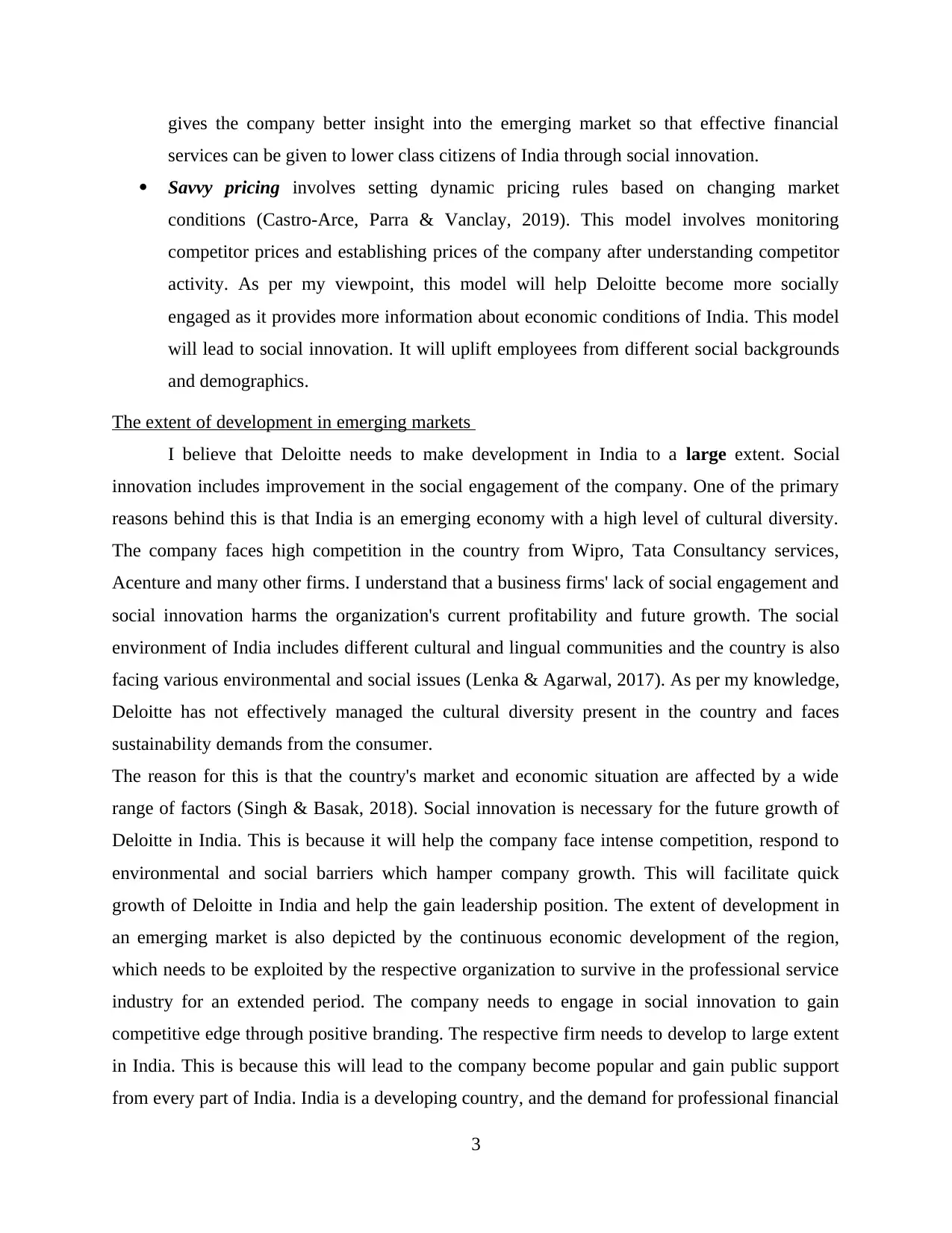
gives the company better insight into the emerging market so that effective financial
services can be given to lower class citizens of India through social innovation.
Savvy pricing involves setting dynamic pricing rules based on changing market
conditions (Castro-Arce, Parra & Vanclay, 2019). This model involves monitoring
competitor prices and establishing prices of the company after understanding competitor
activity. As per my viewpoint, this model will help Deloitte become more socially
engaged as it provides more information about economic conditions of India. This model
will lead to social innovation. It will uplift employees from different social backgrounds
and demographics.
The extent of development in emerging markets
I believe that Deloitte needs to make development in India to a large extent. Social
innovation includes improvement in the social engagement of the company. One of the primary
reasons behind this is that India is an emerging economy with a high level of cultural diversity.
The company faces high competition in the country from Wipro, Tata Consultancy services,
Acenture and many other firms. I understand that a business firms' lack of social engagement and
social innovation harms the organization's current profitability and future growth. The social
environment of India includes different cultural and lingual communities and the country is also
facing various environmental and social issues (Lenka & Agarwal, 2017). As per my knowledge,
Deloitte has not effectively managed the cultural diversity present in the country and faces
sustainability demands from the consumer.
The reason for this is that the country's market and economic situation are affected by a wide
range of factors (Singh & Basak, 2018). Social innovation is necessary for the future growth of
Deloitte in India. This is because it will help the company face intense competition, respond to
environmental and social barriers which hamper company growth. This will facilitate quick
growth of Deloitte in India and help the gain leadership position. The extent of development in
an emerging market is also depicted by the continuous economic development of the region,
which needs to be exploited by the respective organization to survive in the professional service
industry for an extended period. The company needs to engage in social innovation to gain
competitive edge through positive branding. The respective firm needs to develop to large extent
in India. This is because this will lead to the company become popular and gain public support
from every part of India. India is a developing country, and the demand for professional financial
3
services can be given to lower class citizens of India through social innovation.
Savvy pricing involves setting dynamic pricing rules based on changing market
conditions (Castro-Arce, Parra & Vanclay, 2019). This model involves monitoring
competitor prices and establishing prices of the company after understanding competitor
activity. As per my viewpoint, this model will help Deloitte become more socially
engaged as it provides more information about economic conditions of India. This model
will lead to social innovation. It will uplift employees from different social backgrounds
and demographics.
The extent of development in emerging markets
I believe that Deloitte needs to make development in India to a large extent. Social
innovation includes improvement in the social engagement of the company. One of the primary
reasons behind this is that India is an emerging economy with a high level of cultural diversity.
The company faces high competition in the country from Wipro, Tata Consultancy services,
Acenture and many other firms. I understand that a business firms' lack of social engagement and
social innovation harms the organization's current profitability and future growth. The social
environment of India includes different cultural and lingual communities and the country is also
facing various environmental and social issues (Lenka & Agarwal, 2017). As per my knowledge,
Deloitte has not effectively managed the cultural diversity present in the country and faces
sustainability demands from the consumer.
The reason for this is that the country's market and economic situation are affected by a wide
range of factors (Singh & Basak, 2018). Social innovation is necessary for the future growth of
Deloitte in India. This is because it will help the company face intense competition, respond to
environmental and social barriers which hamper company growth. This will facilitate quick
growth of Deloitte in India and help the gain leadership position. The extent of development in
an emerging market is also depicted by the continuous economic development of the region,
which needs to be exploited by the respective organization to survive in the professional service
industry for an extended period. The company needs to engage in social innovation to gain
competitive edge through positive branding. The respective firm needs to develop to large extent
in India. This is because this will lead to the company become popular and gain public support
from every part of India. India is a developing country, and the demand for professional financial
3
Paraphrase This Document
Need a fresh take? Get an instant paraphrase of this document with our AI Paraphraser
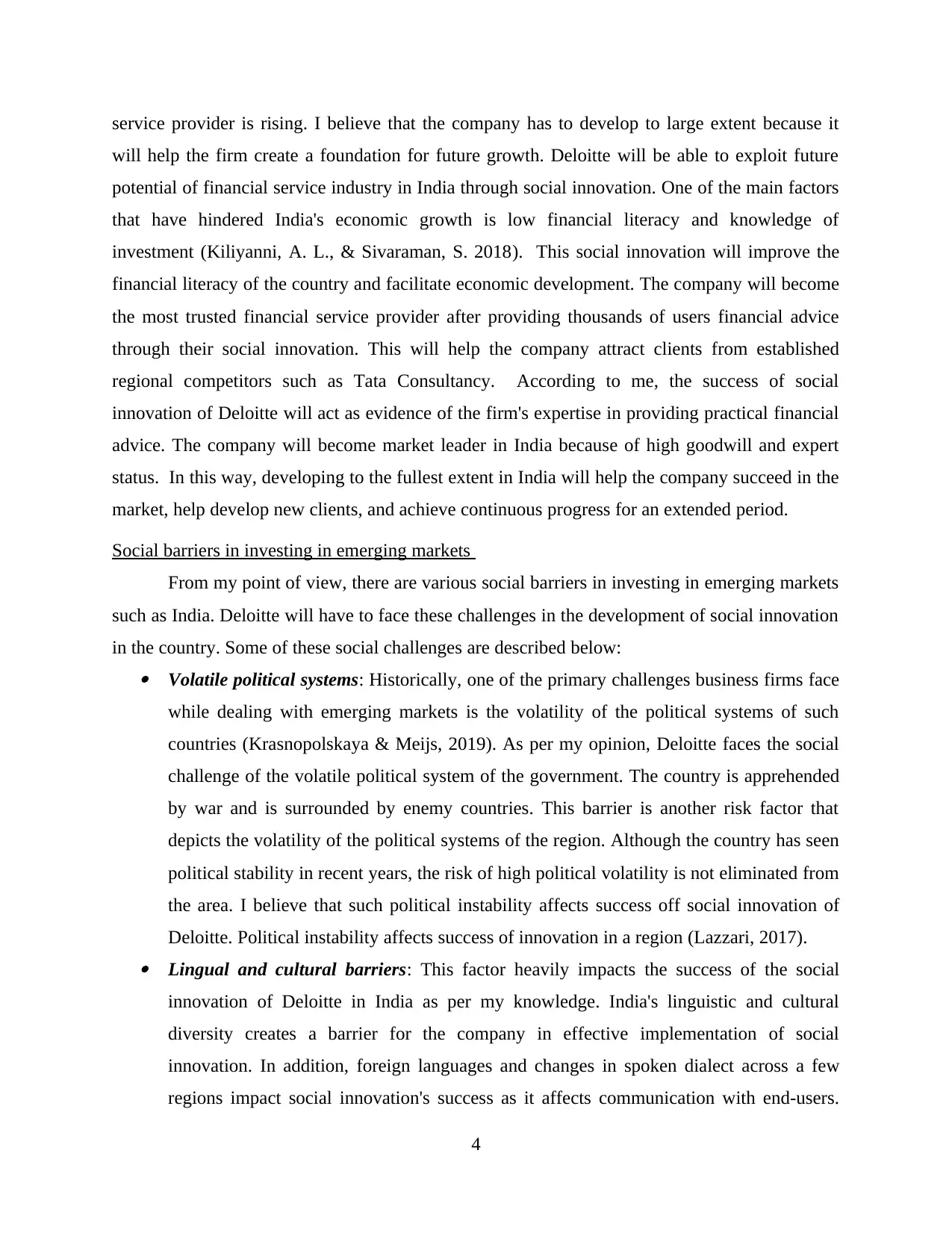
service provider is rising. I believe that the company has to develop to large extent because it
will help the firm create a foundation for future growth. Deloitte will be able to exploit future
potential of financial service industry in India through social innovation. One of the main factors
that have hindered India's economic growth is low financial literacy and knowledge of
investment (Kiliyanni, A. L., & Sivaraman, S. 2018). This social innovation will improve the
financial literacy of the country and facilitate economic development. The company will become
the most trusted financial service provider after providing thousands of users financial advice
through their social innovation. This will help the company attract clients from established
regional competitors such as Tata Consultancy. According to me, the success of social
innovation of Deloitte will act as evidence of the firm's expertise in providing practical financial
advice. The company will become market leader in India because of high goodwill and expert
status. In this way, developing to the fullest extent in India will help the company succeed in the
market, help develop new clients, and achieve continuous progress for an extended period.
Social barriers in investing in emerging markets
From my point of view, there are various social barriers in investing in emerging markets
such as India. Deloitte will have to face these challenges in the development of social innovation
in the country. Some of these social challenges are described below: Volatile political systems: Historically, one of the primary challenges business firms face
while dealing with emerging markets is the volatility of the political systems of such
countries (Krasnopolskaya & Meijs, 2019). As per my opinion, Deloitte faces the social
challenge of the volatile political system of the government. The country is apprehended
by war and is surrounded by enemy countries. This barrier is another risk factor that
depicts the volatility of the political systems of the region. Although the country has seen
political stability in recent years, the risk of high political volatility is not eliminated from
the area. I believe that such political instability affects success off social innovation of
Deloitte. Political instability affects success of innovation in a region (Lazzari, 2017). Lingual and cultural barriers: This factor heavily impacts the success of the social
innovation of Deloitte in India as per my knowledge. India's linguistic and cultural
diversity creates a barrier for the company in effective implementation of social
innovation. In addition, foreign languages and changes in spoken dialect across a few
regions impact social innovation's success as it affects communication with end-users.
4
will help the firm create a foundation for future growth. Deloitte will be able to exploit future
potential of financial service industry in India through social innovation. One of the main factors
that have hindered India's economic growth is low financial literacy and knowledge of
investment (Kiliyanni, A. L., & Sivaraman, S. 2018). This social innovation will improve the
financial literacy of the country and facilitate economic development. The company will become
the most trusted financial service provider after providing thousands of users financial advice
through their social innovation. This will help the company attract clients from established
regional competitors such as Tata Consultancy. According to me, the success of social
innovation of Deloitte will act as evidence of the firm's expertise in providing practical financial
advice. The company will become market leader in India because of high goodwill and expert
status. In this way, developing to the fullest extent in India will help the company succeed in the
market, help develop new clients, and achieve continuous progress for an extended period.
Social barriers in investing in emerging markets
From my point of view, there are various social barriers in investing in emerging markets
such as India. Deloitte will have to face these challenges in the development of social innovation
in the country. Some of these social challenges are described below: Volatile political systems: Historically, one of the primary challenges business firms face
while dealing with emerging markets is the volatility of the political systems of such
countries (Krasnopolskaya & Meijs, 2019). As per my opinion, Deloitte faces the social
challenge of the volatile political system of the government. The country is apprehended
by war and is surrounded by enemy countries. This barrier is another risk factor that
depicts the volatility of the political systems of the region. Although the country has seen
political stability in recent years, the risk of high political volatility is not eliminated from
the area. I believe that such political instability affects success off social innovation of
Deloitte. Political instability affects success of innovation in a region (Lazzari, 2017). Lingual and cultural barriers: This factor heavily impacts the success of the social
innovation of Deloitte in India as per my knowledge. India's linguistic and cultural
diversity creates a barrier for the company in effective implementation of social
innovation. In addition, foreign languages and changes in spoken dialect across a few
regions impact social innovation's success as it affects communication with end-users.
4
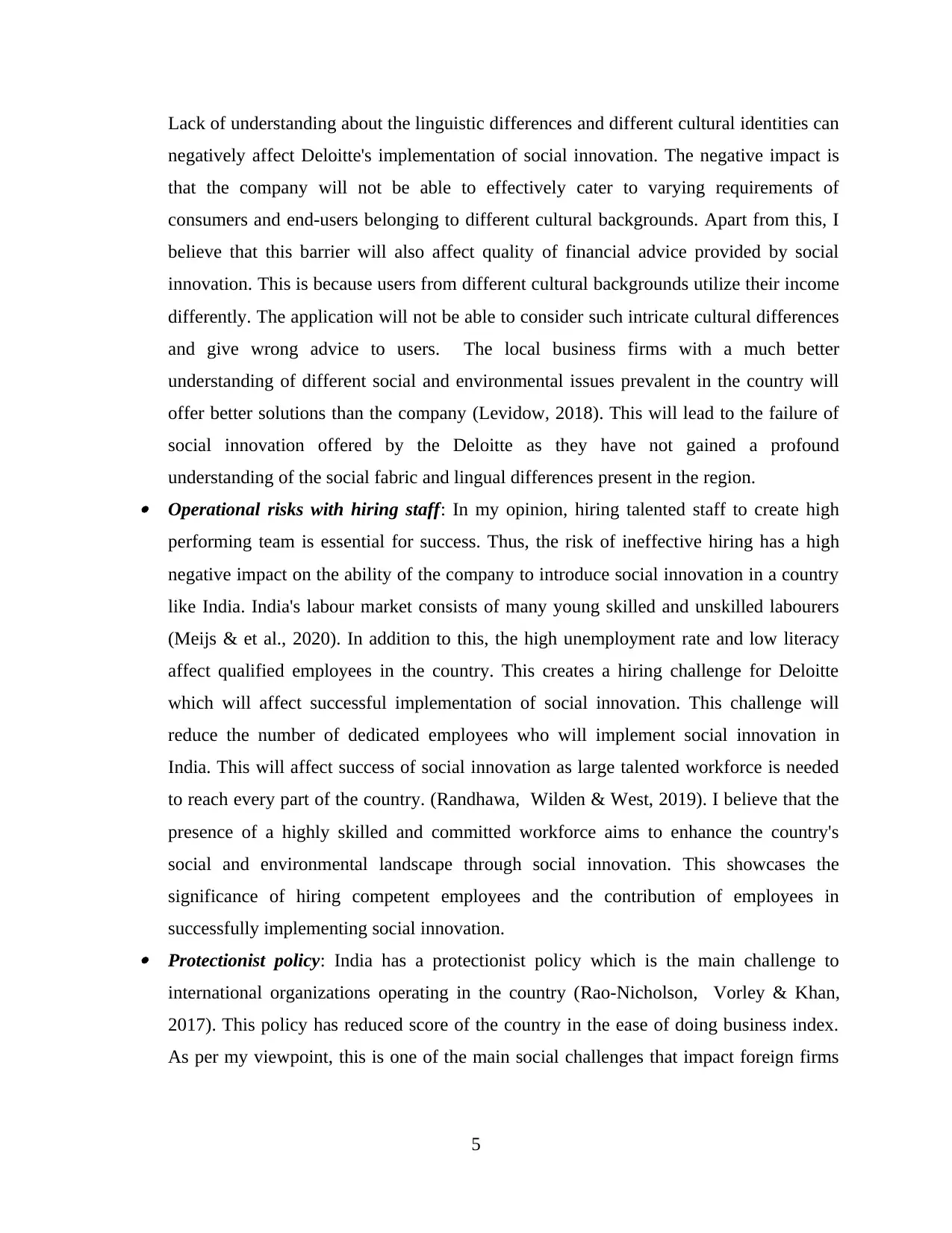
Lack of understanding about the linguistic differences and different cultural identities can
negatively affect Deloitte's implementation of social innovation. The negative impact is
that the company will not be able to effectively cater to varying requirements of
consumers and end-users belonging to different cultural backgrounds. Apart from this, I
believe that this barrier will also affect quality of financial advice provided by social
innovation. This is because users from different cultural backgrounds utilize their income
differently. The application will not be able to consider such intricate cultural differences
and give wrong advice to users. The local business firms with a much better
understanding of different social and environmental issues prevalent in the country will
offer better solutions than the company (Levidow, 2018). This will lead to the failure of
social innovation offered by the Deloitte as they have not gained a profound
understanding of the social fabric and lingual differences present in the region. Operational risks with hiring staff: In my opinion, hiring talented staff to create high
performing team is essential for success. Thus, the risk of ineffective hiring has a high
negative impact on the ability of the company to introduce social innovation in a country
like India. India's labour market consists of many young skilled and unskilled labourers
(Meijs & et al., 2020). In addition to this, the high unemployment rate and low literacy
affect qualified employees in the country. This creates a hiring challenge for Deloitte
which will affect successful implementation of social innovation. This challenge will
reduce the number of dedicated employees who will implement social innovation in
India. This will affect success of social innovation as large talented workforce is needed
to reach every part of the country. (Randhawa, Wilden & West, 2019). I believe that the
presence of a highly skilled and committed workforce aims to enhance the country's
social and environmental landscape through social innovation. This showcases the
significance of hiring competent employees and the contribution of employees in
successfully implementing social innovation. Protectionist policy: India has a protectionist policy which is the main challenge to
international organizations operating in the country (Rao-Nicholson, Vorley & Khan,
2017). This policy has reduced score of the country in the ease of doing business index.
As per my viewpoint, this is one of the main social challenges that impact foreign firms
5
negatively affect Deloitte's implementation of social innovation. The negative impact is
that the company will not be able to effectively cater to varying requirements of
consumers and end-users belonging to different cultural backgrounds. Apart from this, I
believe that this barrier will also affect quality of financial advice provided by social
innovation. This is because users from different cultural backgrounds utilize their income
differently. The application will not be able to consider such intricate cultural differences
and give wrong advice to users. The local business firms with a much better
understanding of different social and environmental issues prevalent in the country will
offer better solutions than the company (Levidow, 2018). This will lead to the failure of
social innovation offered by the Deloitte as they have not gained a profound
understanding of the social fabric and lingual differences present in the region. Operational risks with hiring staff: In my opinion, hiring talented staff to create high
performing team is essential for success. Thus, the risk of ineffective hiring has a high
negative impact on the ability of the company to introduce social innovation in a country
like India. India's labour market consists of many young skilled and unskilled labourers
(Meijs & et al., 2020). In addition to this, the high unemployment rate and low literacy
affect qualified employees in the country. This creates a hiring challenge for Deloitte
which will affect successful implementation of social innovation. This challenge will
reduce the number of dedicated employees who will implement social innovation in
India. This will affect success of social innovation as large talented workforce is needed
to reach every part of the country. (Randhawa, Wilden & West, 2019). I believe that the
presence of a highly skilled and committed workforce aims to enhance the country's
social and environmental landscape through social innovation. This showcases the
significance of hiring competent employees and the contribution of employees in
successfully implementing social innovation. Protectionist policy: India has a protectionist policy which is the main challenge to
international organizations operating in the country (Rao-Nicholson, Vorley & Khan,
2017). This policy has reduced score of the country in the ease of doing business index.
As per my viewpoint, this is one of the main social challenges that impact foreign firms
5
⊘ This is a preview!⊘
Do you want full access?
Subscribe today to unlock all pages.

Trusted by 1+ million students worldwide
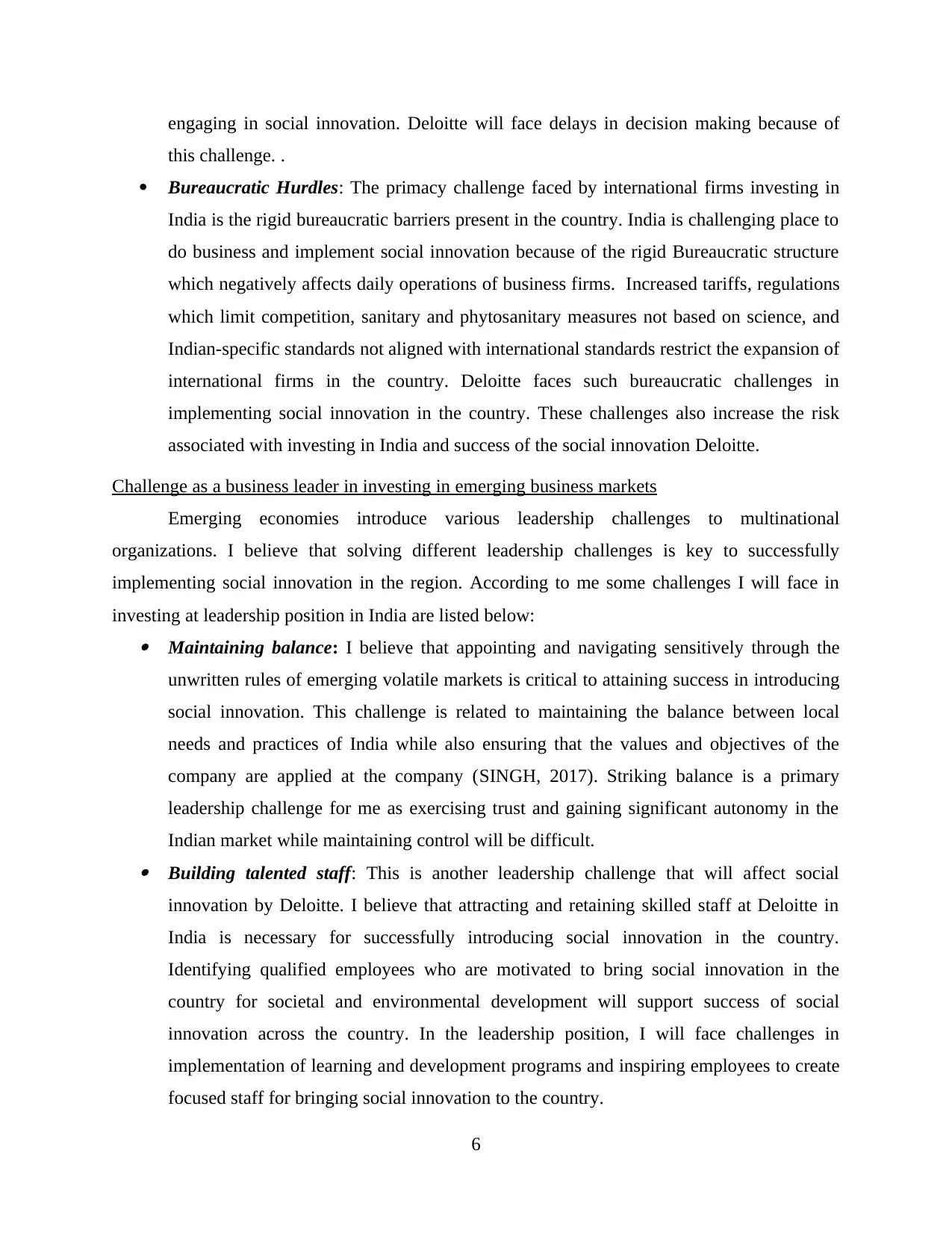
engaging in social innovation. Deloitte will face delays in decision making because of
this challenge. .
Bureaucratic Hurdles: The primacy challenge faced by international firms investing in
India is the rigid bureaucratic barriers present in the country. India is challenging place to
do business and implement social innovation because of the rigid Bureaucratic structure
which negatively affects daily operations of business firms. Increased tariffs, regulations
which limit competition, sanitary and phytosanitary measures not based on science, and
Indian-specific standards not aligned with international standards restrict the expansion of
international firms in the country. Deloitte faces such bureaucratic challenges in
implementing social innovation in the country. These challenges also increase the risk
associated with investing in India and success of the social innovation Deloitte.
Challenge as a business leader in investing in emerging business markets
Emerging economies introduce various leadership challenges to multinational
organizations. I believe that solving different leadership challenges is key to successfully
implementing social innovation in the region. According to me some challenges I will face in
investing at leadership position in India are listed below: Maintaining balance: I believe that appointing and navigating sensitively through the
unwritten rules of emerging volatile markets is critical to attaining success in introducing
social innovation. This challenge is related to maintaining the balance between local
needs and practices of India while also ensuring that the values and objectives of the
company are applied at the company (SINGH, 2017). Striking balance is a primary
leadership challenge for me as exercising trust and gaining significant autonomy in the
Indian market while maintaining control will be difficult. Building talented staff: This is another leadership challenge that will affect social
innovation by Deloitte. I believe that attracting and retaining skilled staff at Deloitte in
India is necessary for successfully introducing social innovation in the country.
Identifying qualified employees who are motivated to bring social innovation in the
country for societal and environmental development will support success of social
innovation across the country. In the leadership position, I will face challenges in
implementation of learning and development programs and inspiring employees to create
focused staff for bringing social innovation to the country.
6
this challenge. .
Bureaucratic Hurdles: The primacy challenge faced by international firms investing in
India is the rigid bureaucratic barriers present in the country. India is challenging place to
do business and implement social innovation because of the rigid Bureaucratic structure
which negatively affects daily operations of business firms. Increased tariffs, regulations
which limit competition, sanitary and phytosanitary measures not based on science, and
Indian-specific standards not aligned with international standards restrict the expansion of
international firms in the country. Deloitte faces such bureaucratic challenges in
implementing social innovation in the country. These challenges also increase the risk
associated with investing in India and success of the social innovation Deloitte.
Challenge as a business leader in investing in emerging business markets
Emerging economies introduce various leadership challenges to multinational
organizations. I believe that solving different leadership challenges is key to successfully
implementing social innovation in the region. According to me some challenges I will face in
investing at leadership position in India are listed below: Maintaining balance: I believe that appointing and navigating sensitively through the
unwritten rules of emerging volatile markets is critical to attaining success in introducing
social innovation. This challenge is related to maintaining the balance between local
needs and practices of India while also ensuring that the values and objectives of the
company are applied at the company (SINGH, 2017). Striking balance is a primary
leadership challenge for me as exercising trust and gaining significant autonomy in the
Indian market while maintaining control will be difficult. Building talented staff: This is another leadership challenge that will affect social
innovation by Deloitte. I believe that attracting and retaining skilled staff at Deloitte in
India is necessary for successfully introducing social innovation in the country.
Identifying qualified employees who are motivated to bring social innovation in the
country for societal and environmental development will support success of social
innovation across the country. In the leadership position, I will face challenges in
implementation of learning and development programs and inspiring employees to create
focused staff for bringing social innovation to the country.
6
Paraphrase This Document
Need a fresh take? Get an instant paraphrase of this document with our AI Paraphraser
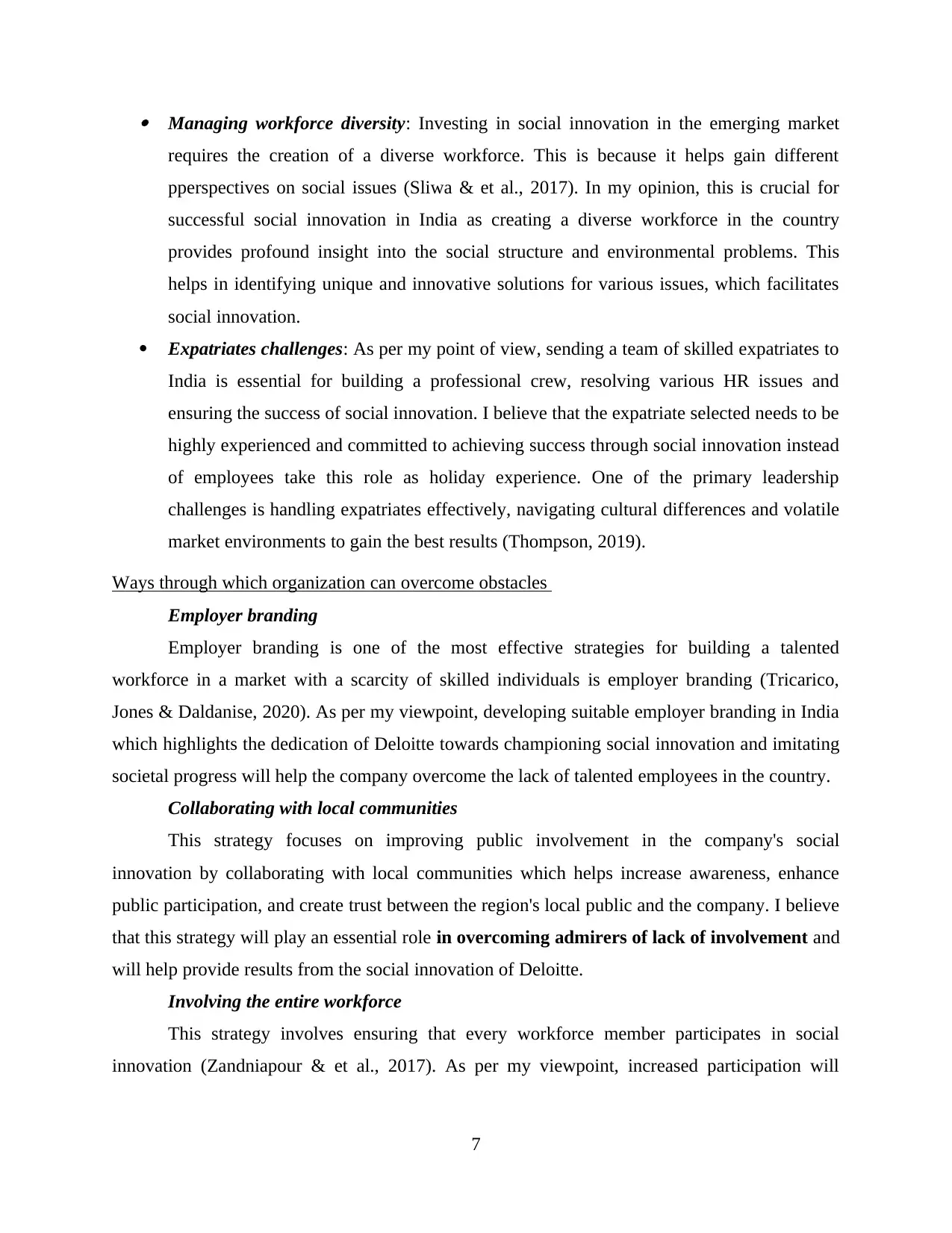
Managing workforce diversity: Investing in social innovation in the emerging market
requires the creation of a diverse workforce. This is because it helps gain different
pperspectives on social issues (Sliwa & et al., 2017). In my opinion, this is crucial for
successful social innovation in India as creating a diverse workforce in the country
provides profound insight into the social structure and environmental problems. This
helps in identifying unique and innovative solutions for various issues, which facilitates
social innovation.
Expatriates challenges: As per my point of view, sending a team of skilled expatriates to
India is essential for building a professional crew, resolving various HR issues and
ensuring the success of social innovation. I believe that the expatriate selected needs to be
highly experienced and committed to achieving success through social innovation instead
of employees take this role as holiday experience. One of the primary leadership
challenges is handling expatriates effectively, navigating cultural differences and volatile
market environments to gain the best results (Thompson, 2019).
Ways through which organization can overcome obstacles
Employer branding
Employer branding is one of the most effective strategies for building a talented
workforce in a market with a scarcity of skilled individuals is employer branding (Tricarico,
Jones & Daldanise, 2020). As per my viewpoint, developing suitable employer branding in India
which highlights the dedication of Deloitte towards championing social innovation and imitating
societal progress will help the company overcome the lack of talented employees in the country.
Collaborating with local communities
This strategy focuses on improving public involvement in the company's social
innovation by collaborating with local communities which helps increase awareness, enhance
public participation, and create trust between the region's local public and the company. I believe
that this strategy will play an essential role in overcoming admirers of lack of involvement and
will help provide results from the social innovation of Deloitte.
Involving the entire workforce
This strategy involves ensuring that every workforce member participates in social
innovation (Zandniapour & et al., 2017). As per my viewpoint, increased participation will
7
requires the creation of a diverse workforce. This is because it helps gain different
pperspectives on social issues (Sliwa & et al., 2017). In my opinion, this is crucial for
successful social innovation in India as creating a diverse workforce in the country
provides profound insight into the social structure and environmental problems. This
helps in identifying unique and innovative solutions for various issues, which facilitates
social innovation.
Expatriates challenges: As per my point of view, sending a team of skilled expatriates to
India is essential for building a professional crew, resolving various HR issues and
ensuring the success of social innovation. I believe that the expatriate selected needs to be
highly experienced and committed to achieving success through social innovation instead
of employees take this role as holiday experience. One of the primary leadership
challenges is handling expatriates effectively, navigating cultural differences and volatile
market environments to gain the best results (Thompson, 2019).
Ways through which organization can overcome obstacles
Employer branding
Employer branding is one of the most effective strategies for building a talented
workforce in a market with a scarcity of skilled individuals is employer branding (Tricarico,
Jones & Daldanise, 2020). As per my viewpoint, developing suitable employer branding in India
which highlights the dedication of Deloitte towards championing social innovation and imitating
societal progress will help the company overcome the lack of talented employees in the country.
Collaborating with local communities
This strategy focuses on improving public involvement in the company's social
innovation by collaborating with local communities which helps increase awareness, enhance
public participation, and create trust between the region's local public and the company. I believe
that this strategy will play an essential role in overcoming admirers of lack of involvement and
will help provide results from the social innovation of Deloitte.
Involving the entire workforce
This strategy involves ensuring that every workforce member participates in social
innovation (Zandniapour & et al., 2017). As per my viewpoint, increased participation will
7

enhance the workforce morale and provide better results as every employee will contribute to the
social innovation at Deloitte on their level.
8
social innovation at Deloitte on their level.
8
⊘ This is a preview!⊘
Do you want full access?
Subscribe today to unlock all pages.

Trusted by 1+ million students worldwide
1 out of 15
Related Documents
Your All-in-One AI-Powered Toolkit for Academic Success.
+13062052269
info@desklib.com
Available 24*7 on WhatsApp / Email
![[object Object]](/_next/static/media/star-bottom.7253800d.svg)
Unlock your academic potential
Copyright © 2020–2026 A2Z Services. All Rights Reserved. Developed and managed by ZUCOL.





